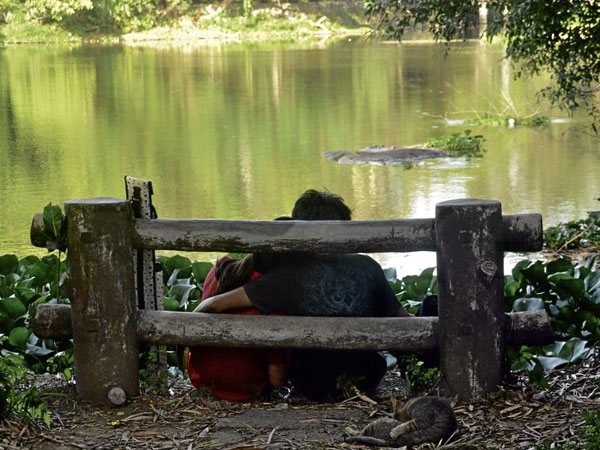80% of Filipinos believe love is destiny

HAPPY VALENTINE’S Love is spending intimate moments with your inamorata at a quiet spot by the pond of the Ninoy Aquino Parks and Wildlife in Quezon City. EDWIN BELLOSILLO
Finding love is a matter of destiny that “cannot be planned or pursued” is a belief shared by almost four in every five Filipinos (78 percent), a Social Weather Stations (SWS) survey has found.
But more than one in five Filipinos 18 and above, or 22 percent, held that finding love entailed an active effort and may not be left to chance.
Results of the SWS survey also showed that those who claimed to have a “very happy” love life declined from an all-time high of 59 percent in December 2011 to 54 percent in December 2012.
Moreover, those who had yet to find a romantic partner rose from 9 percent in 2011 to a record 13 percent in 2012.
The survey, conducted between Dec. 8 and 11, 2012, asked 1,200 adults nationwide whether they believed that “love cannot be planned and pursued, it just comes to a person” or “love is planned and pursued until a person finds it.”
Article continues after this advertisementBy gender, more women (84 percent) than men (72 percent) believed that love would come to a person by chance.
Article continues after this advertisementMore men (28 percent) than women (16 percent) said love was planned and pursued.
Respondents were also made to assess their love life—whether they were “very happy,” “could be happier” or have “no love life.”
Those who said they could be happier barely moved from 31 percent in 2011 to 33 percent in 2012.
By gender, more men (58 percent) than women (49 percent) assessed their love life to be “very happy.”
On the other hand, more women (36 percent) said their romantic life “could be happier” compared with men (30 percent).
The percentages of those who “do not have a love life” were similar for men (12 percent) and women (14 percent).
Among men, those who were “very happy” with their love life were mostly in the 45 to 54 age group (63 percent), while those who “could be happier” were mostly in the 25 to 44 bracket (33 percent to 34 percent).
Among women, those who have a “very happy” love life belonged mostly to the 25 to 34 age range (56 percent), while those who “could be happier” were mostly in the 18 to 24 bracket (46 percent).
The SWS noted that loveless men were highest in the 18 to 24 age group (31 percent), while women with no love life were highest among those aged 55 and above.
By civil status, 63 percent of married adults and 54 percent of those with a live-in partner said they were very happy with their love life, compared with only 31 percent of those who were single.
The noncommissioned survey had a margin of error of plus-or-minus three percentage points.—Lawrence de Guzman, Inquirer Research